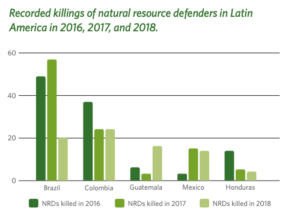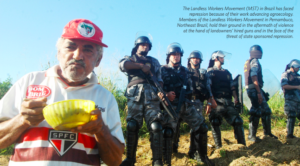Original article by Gargi Sharma in the Human Rights Funders Network blog on March 20, 2020.
Urgent Action Fund’s grantee Eva Bande was arrested and sentenced to four years’ imprisonment in May 2014 for participating in a peasant-led action against a national palm oil company in Indonesia. Nilce de Souza was disappeared in January 2016, and found murdered five months later, for her protest against the construction of a hydroelectric dam in Brazil. Global Greengrants Fund’s grantee partner Bettina Cruz has been jailed and beaten, and has received multiple death threats, for defending Indigenous lands against a wind energy project in Mexico.
These and many more natural resource defenders put their lives on the line every day to defend our planet, yet they are increasingly being murdered and assaulted. The human and environmental cost of mining and agribusiness is devastating, yet violations by government and corporate actors continue with impunity. In the absence of government support for earth defenders, philanthropists have had to step in to resource natural resource defense.
The need to step in and support frontline communities is even more critical during a pandemic. In the past, authoritarian leaders have used fear and uncertainty during times of crisis to try to stifle dissent and close civic space. As funders, our work has to continue, and become bolder. The outbreak of COVID-19 has shown us that what was considered impossible mere days ago, is not only politically expedient now, but also inevitable. Crises like these demand increased trust in grassroots partners and flexibility in meeting their needs.
The CLIMA Fund has released a new report, Resourcing Earth Defenders: The Philanthropic Response to Heightened Repression in Latin America, which highlights the increasing repression of natural resource defenders globally, at the hands of corporations and governments driving the climate crisis. Drawing from 25 interviews with experts across the region, the report finds that grants to environmental, land, and Indigenous rights defenders amount to about 5% of all human rights funding globally, while the same population represents over half of all human rights defenders killed in the last few years. Latin America is the deadliest region for environmental defenders, with those engaged in protesting against mining and agribusiness the worst affected.
In 2017, 57 Earth defenders were killed in Brazil alone, the highest of any country in which Global Witness has tracked deaths. This number is steadily rising as Brazil’s president, Jair Bolsonaro, pledges to open Indigenous lands for commercial exploitation, spurring land grabs and violence against natural resource defenders in the country.

With catastrophic climate change and rising authoritarianism, vulnerable frontline communities are paying the price with their lands, cultures, and livelihoods. As the civic space to advocate and lobby for human rights shrinks, these communities are actively being disenfranchised. Authoritarian governments around the world are giving precedence to corporate interests over the lives of people. This lack of social and policy protection means that the residents have no other choice but to protest.
Women, LGBTQIA+, Indigenous, and Afro-descendant Earth defenders are facing the brunt of climate impacts, bravely defending our planet, and experiencing the greatest violence and impunity.
“Our funding practices should reflect the gendered nature of many of these threats and attacks, and acknowledge that women, LGBTQIA+, Indigenous, and Afro-descendant NRDs face greater and more personal forms of violence. This report highlights these groups and how funders can support those working at the intersections of gender, economic, and climate justice.” – Kate Kroeger, Executive Director of the Urgent Action Fund for Women’s Human Rights and member of the CLIMA Fund
The threat to these groups is also underestimated, due to how Global Witness and other organizations define natural resource defenders. For example, according to the UN’s records, 107 activists were killed in 2019 in Colombia. And according to the Cauca Indigenous Regional Council (CRIC), just in the Cauca Department of Colombia, there were 68 assassinations, 179 individual death threats, and 15 massacres. With one Indigenous person dying every 72 hours in Cauca, Indigenous groups have called the increasing violence against Earth defenders a “genocide.”

While the need for action is high and threats are ever-present, only a fraction of global funding supports human rights defenders. Natural resource defenders constitute over 50% of all human rights defenders’ deaths, yet they receive only 3% of private funding globally. Support is often crisis-centered in the form of rapid-response emergency funding after the threat or violence has taken place, rather than long-term funding to aid movement-building and resilience.
Resourcing Earth Defenders makes the case for a philanthropic response to increasing violence and repression that moves from a crisis-centered approach to a movement-building one. Funding for rapid response; flexible, long-term movement work; and seed grants to emerging groups are all critical for supporting the movements in which natural resource defenders work. Moving to more holistic strategies of funding means investing in prevention through the movements addressing the drivers of repression in the first place, such as militarism, extractive industries, and dispossession.
“Funders have an opportunity to change the way we support these life defenders. It looks like providing flexible and more holistic support to not only defenders, but the struggles that could transform repression in the first place.” – Lindley Mease, CLIMA Fund Director
Hundreds of thousands of people are putting their lives on the line for our collective well-being every day. It is time funders stood not just with Eva, Nilce, and Bettina, but also the movements and visions they fight for.
Click here to read the Resourcing Earth Defenders report and learn more about resourcing grassroots solutions.